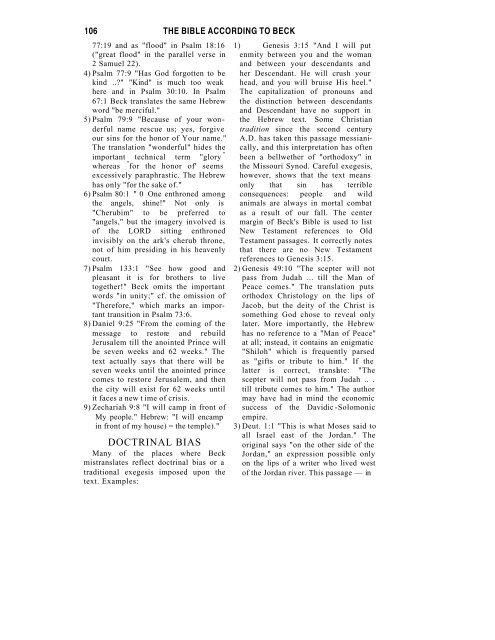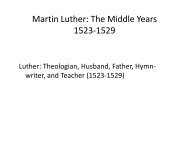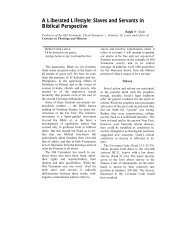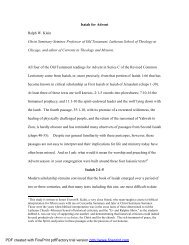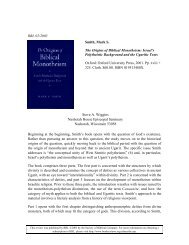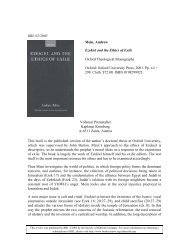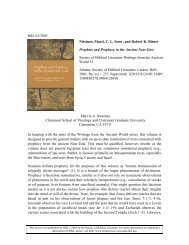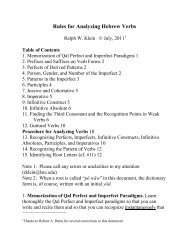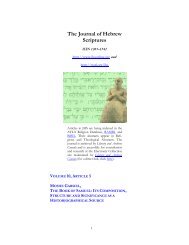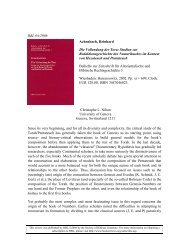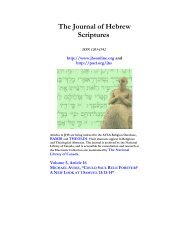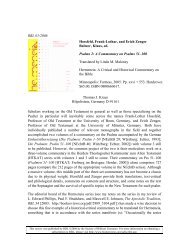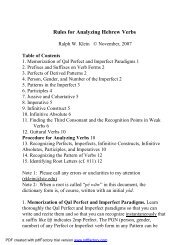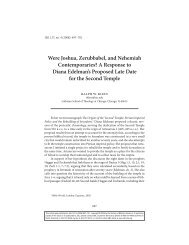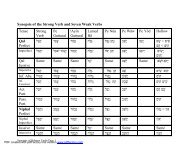The Bible According to Beck
The Bible According to Beck
The Bible According to Beck
Create successful ePaper yourself
Turn your PDF publications into a flip-book with our unique Google optimized e-Paper software.
106 THE BIBLE ACCORDING TO BECK<br />
77:19 and as "flood" in Psalm 18:16<br />
("great flood" in the parallel verse in<br />
2 Samuel 22).<br />
4) Psalm 77:9 "Has God forgotten <strong>to</strong> be<br />
kind ..?" "Kind" is much <strong>to</strong>o weak<br />
here and in Psalm 30:10. In Psalm<br />
67:1 <strong>Beck</strong> translates the same Hebrew<br />
word "be merciful."<br />
5) Psalm 79:9 "Because of your wonderful<br />
name rescue us; yes, forgive<br />
our sins for the honor of Your name."<br />
<strong>The</strong> translation "wonderful" hides the<br />
important technical term "glory "<br />
whereas<br />
" for the honor of' seems<br />
excessively paraphrastic. <strong>The</strong> Hebrew<br />
has only "for the sake of."<br />
6) Psalm 80:1 "0 One enthroned among<br />
the angels, shine!" Not only is<br />
"Cherubim" <strong>to</strong> be preferred <strong>to</strong><br />
"angels," but the imagery involved is<br />
of the LORD sitting enthroned<br />
invisibly on the ark's cherub throne,<br />
not of him presiding in his heavenly<br />
court.<br />
7) Psalm 133:1 "See how good and<br />
pleasant it is for brothers <strong>to</strong> live<br />
<strong>to</strong>gether!" <strong>Beck</strong> omits the important<br />
words "in unity;" cf. the omission of<br />
"<strong>The</strong>refore," which marks an important<br />
transition in Psalm 73:6.<br />
8) Daniel 9:25 "From the coming of the<br />
message <strong>to</strong> res<strong>to</strong>re and rebuild<br />
Jerusalem till the anointed Prince will<br />
be seven weeks and 62 weeks." <strong>The</strong><br />
text actually says that there will be<br />
seven weeks until the anointed prince<br />
comes <strong>to</strong> res<strong>to</strong>re Jerusalem, and then<br />
the city will exist for 62 weeks until<br />
it faces a new t ime of crisis.<br />
9) Zechariah 9:8 "I will camp in front of<br />
My people." Hebrew: "I will encamp<br />
in front of my house) = the temple)."<br />
DOCTRINAL BIAS<br />
Many of the places where <strong>Beck</strong><br />
mistranslates reflect doctrinal bias or a<br />
traditional exegesis imposed upon the<br />
text. Examples:<br />
1) Genesis 3:15 "And I will put<br />
enmity between you and the woman<br />
and between your descendants and<br />
her Descendant. He will crush your<br />
head, and you will bruise His heel."<br />
<strong>The</strong> capitalization of pronouns and<br />
the distinction between descendants<br />
and Descendant have no support in<br />
the Hebrew text. Some Christian<br />
tradition since the second century<br />
A.D. has taken this passage messianically,<br />
and this interpretation has often<br />
been a bellwether of "orthodoxy" in<br />
the Missouri Synod. Careful exegesis,<br />
however, shows that the text means<br />
only that sin has terrible<br />
consequences: people and wild<br />
animals are always in mortal combat<br />
as a result of our fall. <strong>The</strong> center<br />
margin of <strong>Beck</strong>'s <strong>Bible</strong> is used <strong>to</strong> list<br />
New Testament references <strong>to</strong> Old<br />
Testament passages. It correctly notes<br />
that there are no New Testament<br />
references <strong>to</strong> Genesis 3:15.<br />
2) Genesis 49:10 "<strong>The</strong> scepter will not<br />
pass from Judah ... till the Man of<br />
Peace comes." <strong>The</strong> translation puts<br />
orthodox Chris<strong>to</strong>logy on the lips of<br />
Jacob, but the deity of the Christ is<br />
something God chose <strong>to</strong> reveal only<br />
later. More importantly, the Hebrew<br />
has no reference <strong>to</strong> a "Man of Peace"<br />
at all; instead, it contains an enigmatic<br />
"Shiloh" which is frequently parsed<br />
as "gifts or tribute <strong>to</strong> him." If the<br />
latter is correct, translate: "<strong>The</strong><br />
scepter will not pass from Judah .. .<br />
till tribute comes <strong>to</strong> him." <strong>The</strong> author<br />
may have had in mind the economic<br />
success of the Davidic -Solomonic<br />
empire.<br />
3) Deut. 1:1 "This is what Moses said <strong>to</strong><br />
all Israel east of the Jordan." <strong>The</strong><br />
original says "on the other side of the<br />
Jordan," an expression possible only<br />
on the lips of a writer who lived west<br />
of the Jordan river. This passage — in


